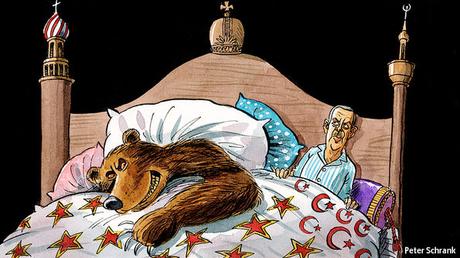
AT ISTANBUL'S naval museum, around the corner from President Recep Tayyip Erdogan's residence, reminders of one of Europe's biggest geopolitical rivalries are everywhere. A bust commemorates Hasan Pasha of Algiers, a commander in a battle in which the Russian fleet burned the Ottoman one to a crisp. The remnants of the Mahmudiye, a galleon that led the siege of Sevastopol during the Crimean War, overlook rows of gilded boats used by the sultans. Such flare-ups are not just things of the distant past. In 2015 Turkish pilots shot down a Russian warplane, and the two powers appeared on the brink of another war. It would have been their 18th.
Instead, the two countries resorted only to insults and sanctions. Since then tensions have ebbed: in June last year Mr Erdogan apologised for the incident. Two weeks later, Russia's president Vladimir Putin rushed to condemn a violent coup attempt against Turkey's government. The two countries have subsequently signed a big gas pipeline deal, agreed to resume work on a nuclear plant in southern Turkey and pledged to increase bilateral trade by more than fivefold, to $ 100bn a year.
...
The Economist: Europe

